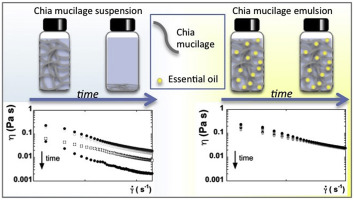当前位置:
X-MOL 学术
›
Food Hydrocoll.
›
论文详情
Our official English website, www.x-mol.net, welcomes your
feedback! (Note: you will need to create a separate account there.)
Protective action of lemongrass essential oil on mucilage from chia (Salvia hispanica) seeds
Food Hydrocolloids ( IF 11.0 ) Pub Date : 2020-08-01 , DOI: 10.1016/j.foodhyd.2020.105860 Francesca Cuomo , Silvio Iacovino , Maria Cristina Messia , Pasquale Sacco , Francesco Lopez
Food Hydrocolloids ( IF 11.0 ) Pub Date : 2020-08-01 , DOI: 10.1016/j.foodhyd.2020.105860 Francesca Cuomo , Silvio Iacovino , Maria Cristina Messia , Pasquale Sacco , Francesco Lopez

|
Abstract Mucilage extracted from chia seeds (Salvia hispanica) is reckoning an increasing interest for its mechanical and nutritional properties. Freeze-dried mucilage dispersed in solvent undergoes degradation, through autoxidation phenomena, that results in the loss of the initial rheological characteristics. In order to limit the extent of depolymerization, an essential oil (lemongrass essential oil, LEO) is here emulsified with chia mucilage (CM) suspensions, and the rheological behavior of samples containing LEO or not compared. Flow curves of CM suspensions and of CM emulsions dispersing LEO (O/W-CM) demonstrated that both the systems can be classified as plastic fluids, and that during storage a general decrease of the viscosity of CM suspensions is detected, while the viscosity of the O/W-CM systems remaining constant. The differences between the two systems were also confirmed by oscillatory tests and through measurements of intrinsic viscosity. By means of an accelerated oxidative test, it was unveiled that the short-term stability of CM suspensions is attributable to the reaction of oxidation, and that the presence of LEO, due to its anti-oxidative properties, allowed for preventing degradation phenomena on the chia mucilage. We conclude that the colloidal stability of chia-based mixtures can definitely be improved following to LEO treatment - hence forming an emulsion - thereby preventing short-term polymer degradation.
中文翻译:

柠檬草精油对奇亚(Salvia hispanica)种子粘液的保护作用
摘要 从奇亚籽(西班牙鼠尾草)中提取的粘液因其机械和营养特性而受到越来越多的关注。分散在溶剂中的冻干粘液通过自氧化现象发生降解,导致初始流变特性的丧失。为了限制解聚的程度,一种精油(柠檬草精油,LEO)在这里用奇异果胶(CM)悬浮液进行乳化,并比较了含有或不含有 LEO 的样品的流变行为。CM 悬浮液和分散 LEO (O/W-CM) 的 CM 乳液的流动曲线表明,这两种系统都可以归类为塑性流体,并且在储存期间检测到 CM 悬浮液的粘度普遍降低,而O/W-CM 系统保持不变。两个系统之间的差异也通过振荡测试和特性粘度的测量得到证实。通过加速氧化试验,发现 CM 悬浮液的短期稳定性归因于氧化反应,并且 LEO 的存在,由于其抗氧化特性,可以防止在奇亚籽粘液。我们得出的结论是,经过 LEO 处理后,奇亚籽混合物的胶体稳定性肯定会得到改善——从而形成乳液——从而防止聚合物的短期降解。CM 悬浮液的短期稳定性归因于氧化反应,并且 LEO 的存在,由于其抗氧化特性,可以防止奇异果胶的降解现象。我们得出的结论是,经过 LEO 处理后,奇亚籽混合物的胶体稳定性肯定会得到改善——从而形成乳液——从而防止聚合物的短期降解。CM 悬浮液的短期稳定性归因于氧化反应,并且 LEO 的存在,由于其抗氧化特性,可以防止奇异果胶的降解现象。我们得出的结论是,经过 LEO 处理后,奇亚籽混合物的胶体稳定性肯定会得到改善——从而形成乳液——从而防止聚合物的短期降解。
更新日期:2020-08-01
中文翻译:

柠檬草精油对奇亚(Salvia hispanica)种子粘液的保护作用
摘要 从奇亚籽(西班牙鼠尾草)中提取的粘液因其机械和营养特性而受到越来越多的关注。分散在溶剂中的冻干粘液通过自氧化现象发生降解,导致初始流变特性的丧失。为了限制解聚的程度,一种精油(柠檬草精油,LEO)在这里用奇异果胶(CM)悬浮液进行乳化,并比较了含有或不含有 LEO 的样品的流变行为。CM 悬浮液和分散 LEO (O/W-CM) 的 CM 乳液的流动曲线表明,这两种系统都可以归类为塑性流体,并且在储存期间检测到 CM 悬浮液的粘度普遍降低,而O/W-CM 系统保持不变。两个系统之间的差异也通过振荡测试和特性粘度的测量得到证实。通过加速氧化试验,发现 CM 悬浮液的短期稳定性归因于氧化反应,并且 LEO 的存在,由于其抗氧化特性,可以防止在奇亚籽粘液。我们得出的结论是,经过 LEO 处理后,奇亚籽混合物的胶体稳定性肯定会得到改善——从而形成乳液——从而防止聚合物的短期降解。CM 悬浮液的短期稳定性归因于氧化反应,并且 LEO 的存在,由于其抗氧化特性,可以防止奇异果胶的降解现象。我们得出的结论是,经过 LEO 处理后,奇亚籽混合物的胶体稳定性肯定会得到改善——从而形成乳液——从而防止聚合物的短期降解。CM 悬浮液的短期稳定性归因于氧化反应,并且 LEO 的存在,由于其抗氧化特性,可以防止奇异果胶的降解现象。我们得出的结论是,经过 LEO 处理后,奇亚籽混合物的胶体稳定性肯定会得到改善——从而形成乳液——从而防止聚合物的短期降解。









































 京公网安备 11010802027423号
京公网安备 11010802027423号